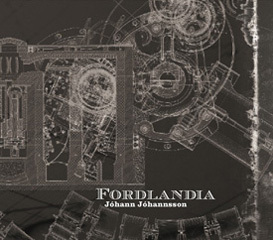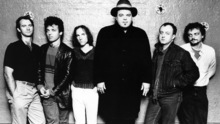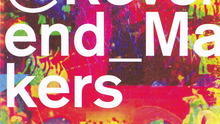Formed in the German city of Mülheim an der Ruhr in 1992, Bohren & Der Club of Gore (their name is partly an homage to the 80s Dutch noisecore band Gore) set out with the self-proclaimed intention of processing a love of rock's more extreme forms into 'doom-ridden jazz music'. This mission has resulted in five albums of oppressive intensity, but with Dolores a silver strip of dawn can be seen at the edge of their louring sky.
The similarities are less constant on Dolores, but it remains impossible to listen to Bohren (which means 'drilling' in German) without being reminded of David Lynch and his composer Angelo Badalamenti. Try listening to second track 'Karin' and its sultry combination of vibes, brushed drums and humming bass without thinking of Audrey's dance in the Double R diner in Twin Peaks. Even when their methods aren't so similar, Bohren still tap into precisely the same wee small hours blend of sexuality, battered glamour, mournfulness and undefined threat that Badalamenti's compositions evoke.
At the same time, the band's affinity with drone metal is clearly identifiable, despite the world they inhabit being markedly different. There are no guitars on Dolores, for a start (in fact there haven't been any guitars on a Bohren record since 1996), but the glacially slow tempo of tracks like 'Staub', allied with the cavernously spacious production that persists throughout the album, conspire to produce a similar listening experience to the work of bands like Growing and Sunn 0))). Parallels can also be drawn to the work of Bohren's Cologne neighbour and ambient-techno legend Gas, whose dense lattices of sound produce a hypnotic effect that presses down on the listener even as it makes them feel weightless.
This mixture of intense weight and exhilarating lightness is exemplified by the eight minute 'Schwarze Biene (Black Maja)', the album highlight. Here an ethereal synth introduction is pinned down by bass and slow-motion brushed drums of almost dub-like heaviness, above which Christopher Clöser's impeccable Fender Rhodes playing picks out a delicate, wandering melody that flickers between the seedy and the uplifting. It This admixture of the brooding and the euphoric, judging by the way the rest of this impressive album plays out, lies at the core of Bohren's approach to making music.
Elsewhere, 'Still am Tresen' is an almost-trad jazz ballad with all the mournful intensity of Alice-era Tom Waits; 'Von Schnäbeln' marries a muffled ambient drone to delicate vibes and the Fender Rhodes (surely the most skilfully deployed weapon in the Bohren arsenal); and closing track 'Welten' wraps funereal bass and drums around a choir intoning with Buddhist depth. There's a caesura here wherein all else falls silent and the Fender Rhodes is left to fill the space for a few moments before the other musicians rejoin alongside an echo-laden saxophone. It's a thrilling moment which, coming at the end of 60 minutes of slow-burning drama, feels like an epiphany.
-
8Chris Power's Score























